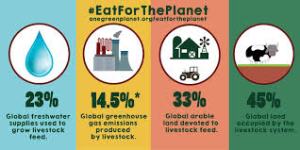“Livestock production takes up more than half the agricultural land used by grazing and producing crops for feed.”
By Linn Smith
First of all, I would like to say I’m not a vegetarian, but I go great lengths of time without eating meat. I grew up on a farm in the Midwest where we farmed the land, milked dairy cows, grew our own food (which was frozen and canned) and raised our own chickens and beef cows (which ended up on the table.) I say “we” because my brother and I were in the fields from the time we were old enough to reach the pedals on the tractors, plus in the dairy barn after school.
As a preteen I came to the conclusion I would eat meat, but I wouldn’t eat a cow I knew or had named and bottle fed from a baby. These were the Black Angus steers we raised for beef. My mom, in order to get me to eat, would tell me she bought the meat on the table at the store. I know, this makes little sense, but it usually worked to some degree. I just didn’t eat much meat as a child.
Today, I do eat some meat, maybe a couple of times a week and some weeks none. But with climate change and growth in world population, I realize I have a responsibility to cut back eating meat even more.
At first I didn’t understand the huge impact raising beef was having on our planet, but now, unless you are a hunter and survive on meat from the wilderness (I have friends that do), then we need to understand the impact that raising and processing animals to put on our table has on climate change.
The Impacts of Cattle Production
Raising cattle can be a multifaceted process and varies from ranch to ranch, but here are a few of the negative impacts on the environment and ecosystem of our planet:
1. Agricultural land usage: Livestock production takes up more than half the agricultural land used by grazing and producing crops for feed. According to The Bloomberg, in the United States in 2018, 654 million acres were for pasture or range usage, while 391.5 million acres were used to grow crops. The crops grown are used for animal feed, ethanol and other practices. Between pastures and cropland used to produce feed, 41% of the land revolves around livestock.
2. Deforestation due to raising livestock: Deforestation in the Brazilian Amazon has increased in the past several years and cattle ranching accounts for 80% of current deforestation rates according to an article by Yale University, “Cattle Ranching in the Amazon Region.” Even though there are better programs through technology to monitor deforestation in the Amazon, restrictions and laws are not always enforced.
According to Evergreen State University in Washington, deforestation for human purposes represents 20% of global CO2 emissions, more than the entire transit sector. To prevent this there needs to be zero deforestation and suppliers and buyers need to be held accountable for the buying and selling practices of cattle raised in South America and the resulting deforestation.
3. Impact on freshwater systems: 1800 gallons of water or more per pound of beef is needed to produce the meat that reaches the cooler in your nearby grocery store. That’s a significant amount of water! If human and animal consumption of fresh water is greater than the restoration of fresh water from rain, freshwater will be depleted. Agriculture, for use in feeding animals and humans, uses approximately 70% of our fresh water!
4. Pollution due to fertilizers: Fertilizers and pesticides are used on crops to feed the cattle. These chemicals are either excreted by the animal into the ground and waterways, or end up being deposited in the animal fat which, again, ends up in the cooler at your local grocery store and consumed by you.
5. Processing and transportation of meat: With the massive land usage and food and water it takes to raise cattle, also comes the huge energy impact to our environment in the processing and packaging of meat and the transportation to get it on the shelf.
Greenhouses Gases and Eating Beef
Experts estimate that 14% of all greenhouse gases come from cattle production and the processing of meat. You can look at the current push towards meat from plants as a fad, or you can view it as a way to help save our planet. The choice is yours.
Follow us on Facebook at: https://m.facebook.com/planetearthweekly/






